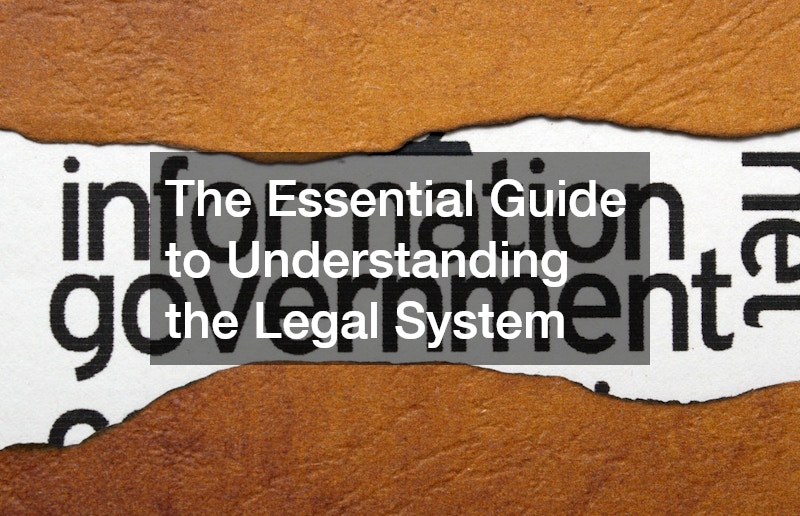Chaos is inevitable in a society that lacks rules. The institutions that keep societies together would crumble without the law. Laws are there to maintain order and justice within society. People don’t realise their existence until they violate them, at which point they will face the consequences of their actions.
Navigating the legal system can be a difficult task, especially if you have little or no knowledge of the laws. Understanding the various areas of law and the roles of different legal professionals is essential, whether you are facing a criminal charge or need help with elder care. This guide provides essential information and will explore other areas of law to help you navigate the legal system with confidence. We will also provide advice on how to hire legal services and highlight key factors when dealing with specific cases. Let’s take a look at some of the different areas of law.
Private Law
Private law encompasses a wide range of legal issues that primarily involve disputes between individuals, businesses, or organisations. These disputes typically revolve around areas such as contracts, property, family matters, and torts, rather than crimes committed against society. While private law can seem overwhelming due to its complexity, understanding the key areas and seeking professional legal advice can help individuals navigate this area of law effectively. Whether it’s a contractual dispute or a personal injury claim, having the right legal guidance ensures that you are aware of your rights and can take appropriate steps to resolve your issue.
In some cases, private investigators play a crucial role in strengthening a case. These professionals can gather evidence, conduct surveillance, and locate witnesses, all of which can be pivotal in proving or disproving a claim. Private investigators are especially valuable in areas such as criminal defence and personal injury cases, where additional evidence can significantly impact the outcome. By working with private investigators, lawyers can build stronger cases, ensuring their clients have the best chance of achieving a favourable result in private law disputes.
Criminal Law

Criminal law is primarily concerned with crimes committed against the government. In such cases, it is typically the state that prosecutes, and the prosecution must prove the guilt of the accused beyond reasonable doubt. If you’re involved in a case involving criminal charges, it’s important to exercise your right to an attorney. A criminal lawyer’s role is to protect the rights of those accused during criminal proceedings.
Criminal lawyers carefully examine the evidence provided by the prosecution to identify any weaknesses or flaws that could cast doubt on a case. They create a solid defence strategy in order to secure the best possible outcome for their clients. It’s important to know that different crimes require specialised lawyers. For example, drug-related cases fall under criminal law, and if you are facing charges related to drug possession, you should hire a drug possession lawyer with experience in this area.
The costs of hiring a criminal lawyer can vary depending on various factors. According to canterburylawgroup.com, the average cost of hiring a highly experienced criminal defence attorney may range from $250 to $750 per hour. Specific fees can also differ depending on whether the crime is classified as a misdemeanour or a felony. It is crucial to discuss the costs and payment arrangements with your lawyer before hiring them.
Environmental Law
Environmental law is an essential framework that aims to safeguard the planet for future generations. It establishes regulations to reduce pollution in air, soil, and water, ensuring that the environment is preserved for both current and future populations. Key issues within environmental law include waste management, the impact of climate change, wildlife conservation, and the assessment of environmental impacts of development projects. Furthermore, this branch of law prioritises the sustainable management of natural resources to maintain ecological balance and prevent the depletion of vital resources. The implementation of these laws ensures a collective responsibility to protect the environment while promoting sustainable growth.
One of the significant aspects of environmental law is the regulation of water resources, which is critical for maintaining clean and safe water supplies. Water damage services play an integral role in this regard, addressing issues like water pollution, conservation, and the management of water resources. These services help mitigate the impact of environmental disasters, such as flooding, and assist in the restoration of affected areas. By managing the quality and availability of clean water, water damage services are vital to both public health and the environment. For those facing legal challenges related to environmental issues, consulting an experienced environmental lawyer can provide the necessary guidance to navigate the complexities of the law.
Tort Law
Tort law deals with civil wrongs, such as personal injury cases. Tort law is relevant to incidents like motorcycle accidents and injuries. Here are some key points to keep in mind:
- Negligence: Motorcyclists may be held liable for negligence if they fail to exercise reasonable care and cause harm to another party. Other motorists may also be held liable for negligence if they damage motorcyclists.
- Duty of Care: Motorcyclists are responsible for their motorcycles, following traffic laws, and taking reasonable precautions to avoid causing harm to others.
- Motorcycle Defects: A defect in a motorcycle that contributes to an injury or accident may lead to a product liability claim against the manufacturer or distributor.
- Strict Liability: Some jurisdictions apply strict liability, holding parties accountable for harm caused by their actions, regardless of fault or negligence.
- Contributory/Comparative Negligence: Some jurisdictions take into account the actions of both parties involved in an accident to determine liability. Compensation may be reduced depending on the level of fault.
It’s important to consult a lawyer who understands tort law in your area, as laws can vary across jurisdictions.
Administrative Law
Administrative law is a common area of law that you will likely encounter when navigating the legal system. It governs administrative agencies, such as government entities, and their decision-making processes. Administrative law is responsible for overseeing government benefits and programs such as Medicare and social security.
Eldercare lawyers specialise in administrative law and provide valuable assistance to older individuals seeking to navigate and apply for government benefits and programs available to seniors. These lawyers are familiar with administrative requirements and procedures and can represent their clients’ rights. While it’s not necessary to hire a lawyer to apply for these benefits, having legal support can increase your chances of getting the benefits you deserve.
It’s also important to consider the costs of hiring an eldercare lawyer. According to Forbes, many eldercare lawyers charge an hourly rate ranging between $350 and $600. The exact fees will depend on factors like the complexity of the case, experience, and geographic location.
An eldercare lawyer can offer several advantages. These lawyers have extensive experience in dealing with administrative agencies and can help navigate the application process. They will also ensure that your documentation is correct and advocate on your behalf. These attorneys can assist with disputes or appeals that may arise during the process of obtaining benefits or resolving eldercare legal issues.
While it is possible to navigate administrative laws and the application processes for government benefits on your own, an eldercare lawyer’s expertise and guidance can significantly increase your chances of success. They are dedicated to helping seniors secure the benefits they deserve, thanks to their knowledge and experience in administrative law.
Health Law
Health law is an interdisciplinary branch of law that encompasses various aspects of healthcare and the legal regulations governing it. It addresses the specific legal challenges that healthcare professionals and organisations face. Medical malpractice claims are a significant concern in the field of health law, as they can result in substantial legal liabilities. Healthcare organisations often seek the expertise of health lawyers to help minimise legal risks.
Healthcare providers involved in medical malpractice cases should also consult health lawyers to understand their legal rights. Attorneys who specialise in health law have a thorough understanding of the complex legal landscape governing the healthcare industry. They assist healthcare organisations with compliance, risk management, and resolving legal issues. These lawyers also provide guidance on healthcare regulations, contractual matters, and medical ethics.
The costs of hiring a health lawyer can vary depending on location, experience, and the complexity of the case. According to Rotkoplaw.com, the average hourly fee for a healthcare lawyer can range from $300 to $400. It’s crucial to discuss fees and payment arrangements with the lawyer before engaging their services.
Personal injury laws are also relevant when dealing with injury accidents. Injury accident lawyers represent individuals who have been injured due to negligence and help them seek compensation for medical expenses, lost wages, and pain and suffering.
Navigating the complex legal system when dealing with health law or personal injury cases can be challenging. It’s vital to hire attorneys who are experts in their respective fields. Factors like the lawyer’s track record, experience, and ability to communicate and advocate on your behalf should all be considered when seeking legal representation.
Constitutional Law

The study of constitutional law provides an in-depth understanding of the fundamental principles that underpin a constitution. It explores the fundamental principles that led to the creation of the constitution, including the supremacy of the constitution, the sovereignty of the people, the principles of democracy, and the doctrine of the separation of powers. Constitutional law plays an essential role in ensuring the constitution is respected and upheld, protecting individual rights and preventing abuses of power.
The constitution of a country is the highest law of the land. Its validity and legality cannot be challenged by any court or government body. Constitutional law is necessary for many reasons, such as ensuring that the Constitution is upheld and respected, protecting the rights of individuals, and promoting basic governance principles. The Constitution provides the framework for the legal system and protects the nation from potential abuses of power by those in positions of authority.
Additionally, you may encounter issues such as bail bonds or license reinstatement. Bail bonds act as a financial guarantee that allows an accused person to be released while awaiting trial. Bail bond agents assist individuals with navigating this complicated process and ensure compliance with court conditions. A licence reinstatement lawyer helps people regain their suspended or revoked licences, whether it’s a driver’s licence, professional licence, or other type of licence. These lawyers help clients navigate the legal process, protect their rights, and ensure their licences are reinstated.
Conclusion
To navigate the legal system, it is crucial to have a comprehensive understanding of all the various aspects of the law. Legal professionals and experts can provide assistance in interpreting the law. With the help of an experienced attorney, you can navigate constitutional law, seek bail if necessary, and work towards reinstating your licence.
A society without laws is chaotic and disordered. The purpose of laws is to punish those who break them and to deter others from doing the same. Studying law is a noble pursuit. It requires discipline and perseverance to complete the course. As you delve deeper into the field, you will likely develop a passion for a particular branch of law.
The law is a vast field, one that can only be partially explored. It may seem difficult to navigate the legal system as a novice, but the more you learn about its different branches, the more enjoyable it becomes. Having a thorough knowledge of the law is vital, as everyday legal issues are more common than you might think. Appreciate the legal systems that ensure the smooth running of society.
This guide offers an overview of important legal issues, including the structure of the legal system, the roles of key actors, and common legal procedures. It also emphasises the importance of seeking legal advice when necessary. By gaining knowledge about the legal system and obtaining proper guidance, individuals can confidently navigate challenges and make informed decisions. Understanding the workings of the legal system helps ensure that fair outcomes are achieved.

